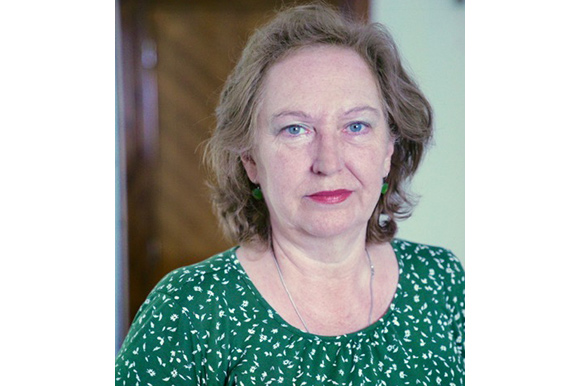 Anca Mitran has been the Head of the Romanian Film Centre since 2014. From 1997 to 2014 she was the Head of the Romanian Film Archives. She has published several works as an expert in restoration and conservation of film heritage and also as a chemical researcher. She is currently teaching at the National University of Theatre and Film Ion Luca Caragiale.
Anca Mitran has been the Head of the Romanian Film Centre since 2014. From 1997 to 2014 she was the Head of the Romanian Film Archives. She has published several works as an expert in restoration and conservation of film heritage and also as a chemical researcher. She is currently teaching at the National University of Theatre and Film Ion Luca Caragiale.
FNE: What are, in your opinion, the most positive developments in the Romanian film industry in 2017-2018?
Anca Mitran: Firstly, the most positive development is the appreciation given to the Romanian cinema abroad. Romanian films have become a steady value in the last years. The year 2018 started with the Golden Bear at the Berlinale for Adina Pintilie’s Touch Me Not and recently Romania had three titles in the Official Competition in Sarajevo, with Ioana Uricaru awarded best director for Lemonade and Love 1: Dog / Dragoste 1: Câine (Romania) by Florin Șerban (produced by Fantascope and also supported by the Romanian Film Centre) receiving two awards from the festival’s partners.
Secondly, the corrections to the grant contest regulation through Order no. 2,693 from 23 October 2017, as well as the increase in the contributions to the Film Fund, have led to a record of 98 feature films supported.
The correction in the regulation consists of the launch of a new thematic section in the grants contest, that will lead new productions to the audience every year, as the theme will be decided by the Council of Administration of the National Film Centre before each grants contest session (films for children and youth, historical films, adaptations, SF, etc).
Regarding the exploitation, a good thing is the re-opening and the opening of a number of cinemas and open air cinemas in Eforie Sud, Brăila, Târgu Mureș, Constanța, Ploiești, Pitești, that will certainly lead to an increase in admissions.
FNE: What is still waiting to be done?
Anca Mitran: Given the evolution and the trend of the Romanian cinema, as well as the new European legislation, we have elaborated a draft for a new Cinema Law, which will be published for public debate on our website until the end of September 2018. We hope for it to be approved by the end of 2018.
We are also working on a set of measures aiming at supporting the modernisation of cinema theatres at the same time with a better distribution for Romanian films.
FNE: How important is the cash rebate scheme approved by the Romanian governement in June 2018 and how soon will we see its results?
Anca Mitran: Film professionals have lobbied for more than 10 years for these measures. In 2017 the National Film Centre initiated and elaborated a project for the introduction of a cash rebate scheme. The scheme you are referring to will be administrated by another institution, the National Commission for Prognosis, so we cannot make predictions regarding its results. But we will follow its evolution as it has a direct impact on our work.
FNE: How important are coproductions with neighboring countries for the Romanian film industry?
Anca Mitran: Presently 80% of Romanian films are coproductions or have European minority coproducers, as coproduction is one of the main financing sources for film productions. But it is more and more difficult to coproduce with countries with big economical power such as France and Germany, where the competition has increased. However, because of its successes, Romania gets the highest number of European applications (for example in France at Cinema du Monde, EFG, etc).
Most of the minority coproducers are neighboring countries: Bulgaria, Hungary, Macedonia etc. Coproducing with neighboring countries is also good for the distribution, resulting in an increase of the distribution of Romanian films in the region.
The corrections to the grants contest in 2017 allowed six international coproductions with Romania to receive funding: Tomasz Wasilewski’s Fool (coproduced by HiFilm Productions), the Bulgarian Waterfall CEO by Svetoslav Drganov (coproduced by Parada Film), Kohki Hasei’s Drunken Fish on the Moon (coproduced by Metropolis Film with Emir Kusturica as executive producer), The Disciple by the Slovakian director Ivan Ostrochovski, Whose Dog Am I?, a documentary by the Hungarian director Robert Lakatos (coproduced by Micro Film), and the Serbian short film Sami by Stefan Orlandic Stojanovski (coproduced by Libra Film).
In the new draft of the Film Law a special section for minority coproductions will be added to the grants contest organised by the National Film Centre.
FNE: Where do you see the Romanian cinema in five years from now?
Anca Mitran: It is very difficult to make a prognosis since the technological development sometimes outperforms the imagination. I guess it is more realistic to try and set a few goals, such as the increase of the audience's fondness for domestic films, the adaptation and improvement of the mechanisms of production funding and domestic films' distribution and, last but not least, as many awards as possible.